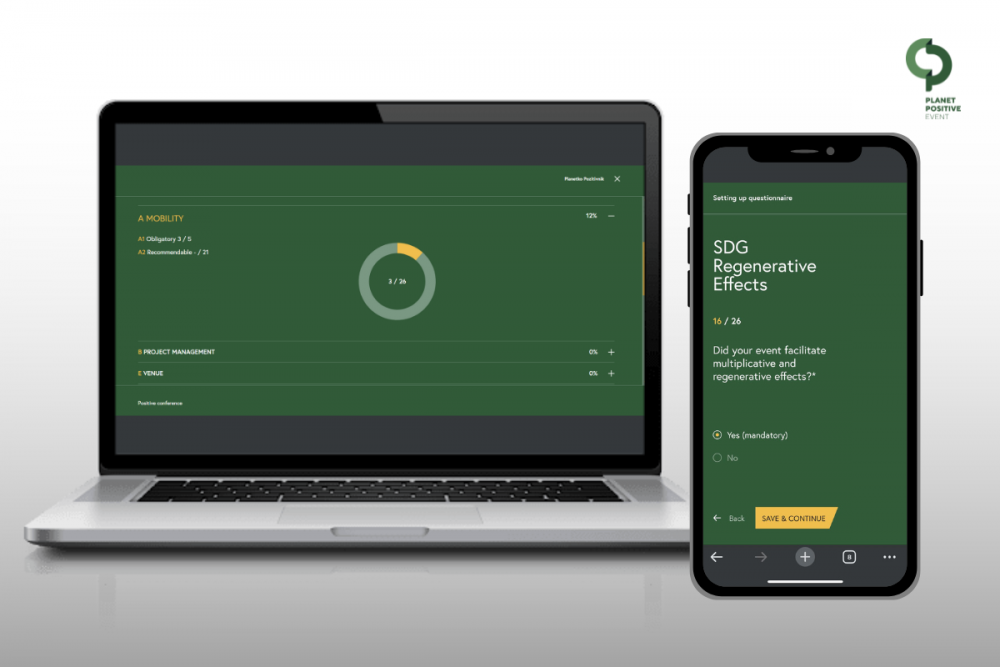
With an estimated 3 to 5 million events of all kinds taking place globally each day — between 240,000 and 480,000 in the EU alone (49.5% of which are corporate) — recommendations and handbooks are no longer enough.
As ESG (Environmental, Social, and Governance) reporting becomes more critical, companies must provide concrete data to demonstrate their commitment to sustainability and ethical practices. Accurate, actionable data is replacing theoretical guidance, pushing businesses to ensure that their events align with ESG goals and contribute meaningfully to their broader corporate responsibility efforts.
“We are organizing big sailing events and want to do them in a sustainable way. Not because of the law, but because it is right to do so,” states Mitja Margon, Head of Organisation of the 2025 Optimist World Championship.

A Data-Driven Approach
July 31, 2023 was a milestone date for European event organizers: the European Commission accepted the first set of European Sustainability Reporting Standards (ESRS) for use by all companies subject to the Corporate Sustainability Reporting Directive (CSRD).
The CSRD represents a quantum leap from the previous Non-Financial Reporting Directive it replaced, considerably increasing both the number of companies that are within the scope of the EU’s ESG reporting regime and the detail and extent of the ESG disclosures that must be published, impacting companies far beyond the EU.
“We were looking for a way to start measuring the impact of our events.” says Maja Vidergar, PCO of Cankarjev Dom, the largest Slovenian convention center. They found support in Planet Positive Event (PPE), an innovative web-based tool that digitizes and fully automates the event sustainability assessment and certification process. “We successfully assessed and enhanced the sustainability of the 54th IAPCO Annual Meeting, gaining valuable insights into reducing environmental impacts while maintaining a high-quality event experience,” concludes Ms. Maja.
Bridging the Gap Between Event Planners and Participants
Music festivals — some of the world’s largest celebrations of music, art, culture, and community — are increasingly adopting sustainable practices such as waste reduction and recycling, energy efficiency optimization, and carbon offset initiatives. While these measures are crucial, their success largely depends on the participation and cooperation of the festival-goers.
So, how can festivals bring attendees on board? There are three key approaches:
Awareness and Education: educating attendees about the environmental impact of festivals and the importance of sustainable practices helps enable and incentivize people to make the right choices.
Behavioral Change: encouraging visitors to adopt sustainable behaviors, such as proper waste disposal and use of public transit, can significantly reduce the environmental footprint of the event.
Community Building: creating a sense of community and shared responsibility enhances the overall festival experience and promotes long-term commitment to sustainability.
An example of sustainability-forward communication from the AtoJazz Festival, provided by Nika Brunet Milunovic.
Festival organizers have found early success in achieving these goals with the help of the Planet Positive Event tool.
“We want to drive meaningful environmental progress,” says Nika Brunet Milunovič, manager for Bulgaria’s AtoJazz Festival. “The PPE tool, with its integration of ESRS Standards and Carbon Footprint Measurement, has provided a clear framework to assess and reduce the festivals’ environmental impact. Beyond just tracking waste, energy, and emissions, the tool offers actionable insights and benchmarks for continuous improvement.”
How Can Such Technologies Help?
The PPE tool, developed in Slovenia, is designed to be streamlined and user-friendly. Once event organizers have registered, they can conduct quick self-assessments of their events’ sustainability profiles. “An external assessor then reviews and either confirms the assessment or seeks additional data,” says Gorazd Čad, Founder of the PPE tool. “Once the assessment is finalized, the sustainability rating is automatically calculated, and a detailed report with a certificate that aligns perfectly with ESRS standards is automatically generated.”
Resources such as this promise to revolutionize event planning for the better, making it easier than ever before to plan and execute events that are both successful and sustainable. As organizers and as attendees, then, let’s embrace a mindful attitude and work together to look out for our planet!
Banner image courtesy of Pexels user Wolfgang. Thumbnail and other photographs courtesy of Arctur.




